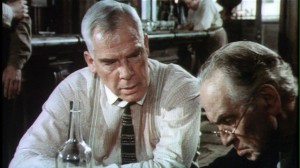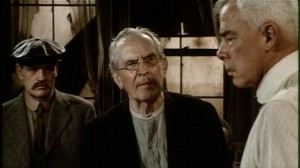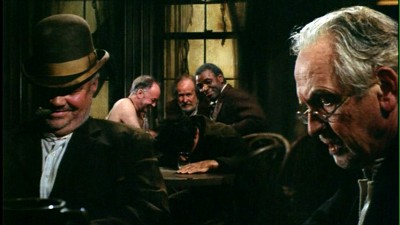
Ely Landau’s American Film Theatre was an experiment that was fully as noble as it was screwy — and fully doomed to failure from the onset. The idea of committing what can only be called high-toned stage drama to film wasn’t new. The movies had been doing it for years in a hit-and-miss fashion. The idea of doing nothing but that was another thing altogether — and making the films with unusual fealty to the source material made them feel more like TV specials than movies. But I suspect the real nail in the coffin was the whole business of selling the films on a season subscription basis. Whatever the case, the experiment only lasted for two seasons. The quality of the films I’ve seen is on the variable side. They don’t really feel like movies, but neither are they simply photographed stage plays. At their best, they at least make for worthwhile records of beautifully performed plays that you might not otherwise see. That’s certainly the case with John Frankenheimer’s version of Eugene O’Neill’s The Iceman Cometh.

Oh, it’s not the most difficult of O’Neill’s plays to produce — that honor still goes to his 1923 “experimental” play Strange Interlude. But at four hours — and full of deep-dish concepts, speeches and symbolism — The Iceman Cometh is no day at the beach, and is clearly for specialized audiences. In fact, it took six years to get it produced, while Strange Interlude only took five. Iceman may lack the earlier play’s easily satirized business of everyone freezing in place while a character “thinks” aloud, but it uses a similar technique — especially in its opening scene — of groups of characters more or less frozen in position until it’s their turn to take the dialogue. In other words, it’s very stylized and very consciously artistic. Your response will depend on your taste for such. It’s up to the individual whether the work is profound or pretentious. Personally, I think it’s both.

The story is fairly simple. It deals with a bunch of largely unhappy barflies who hang out in a bar run by the ironically named Harry Hope (Fredric March in his final film), who has not been out of the establishment since his wife died 20 years ago. Like most of the characters, however, he has plans to go out “tomorrow.” Everyone lives for this nebulous tomorrow that never seems to come. The only one who doesn’t is Larry Slade (Robert Ryan in his final film), a former member of what’s referred to as “the movement” (the Wobblies), who has signed off from the world and has only been waiting for his own demise — or he would be if a young man, Don Parritt (Jeff Bridges), who may or may not be his son, hadn’t shown up. The big impending event is the arrival of Theodore Hickey (Lee Marvin), a traveling salesman who is expected for Harry’s 60th birthday. It takes an hour of the film before Hickey actually shows up — and when he does, he’s nothing like the Hickey they’ve been expecting. What happens from this point makes up the bulk of the drama. Regardless of how you feel about the play itself, it’s hard to deny that this version of it is filled with performances that are a treasure to have preserved for us.




Before you comment
The comments section is here to provide a platform for civil dialogue on the issues we face together as a local community. Xpress is committed to offering this platform for all voices, but when the tone of the discussion gets nasty or strays off topic, we believe many people choose not to participate. Xpress editors are determined to moderate comments to ensure a constructive interchange is maintained. All comments judged not to be in keeping with the spirit of civil discourse will be removed and repeat violators will be banned. See here for our terms of service. Thank you for being part of this effort to promote respectful discussion.